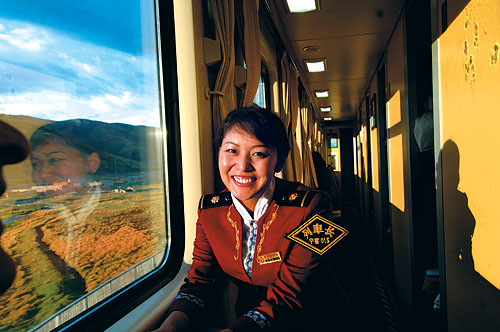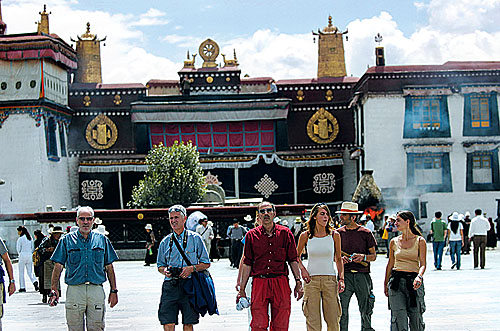|
 The Qinghai-Tibet Railway is obviously a boon for the travelers. This is the Tibetan chief conductor.
The Qinghai-Tibet Railway is obviously a boon for the travelers. This is the Tibetan chief conductor.
Tibet, at an average altitude of more than 1,500 meters, has a big temperature difference between daylight and night. You should have an enough mental, physical and material preparation for the journey of Tibet.
1. At high altitude of over 2,000 meters, many people, especially the feeble, generally suffer some bodily reaction. They should arrange to have oxygen handy.
2. Do have a good rest before going to Tibet, or you will have a chronic headache. You need to accommodate yourself to new circumstances for three-five days after arriving on the plateau, in which you are not advised to go on a long journey. You had better pay a visit to places nearby in order to avoid breathing problems and reaction to cold. If you have a cold, cough, fever and other symptoms, you must see a doctor lest emphysema develop.
3. Take sunglass, sun-block cream, sportswear, down and feather garments, sweater, traveling shoes, electric torch, rain gear, and the medicine to cope with climate change. Even in summer, cold weather clothing is necessary in the morning and evening.
4. If you go on a trip alone, you should take sufficient foods with high calories such as biscuit, chocolate and candy, and enough water. You should have the psychological preparation for coping with all kinds of emergencies.
5. You’d better bring enough cash on you. There are branch offices of various main commercial banks of China in Tibet, but the service of drawing cash from credit cards is available only in the Bank of China. If you fear it is not safe to take a lot of cash, you can deposit the cash into the outlets of the Bank of China. Postal savings is developed in Tibet with numerous outlets.
6. The website of the Tibet Tourism Information (www.xzta.gov.cn) was officially launched in Lhasa to help tourists who will go to Tibet learn more information.
 Foreign tourists in front of the Jokhang Monastery Square in Lhasa.
Foreign tourists in front of the Jokhang Monastery Square in Lhasa.
At present, this website consists of two parts, namely, the Business Website of the Tourism Information and the Website of Government Affairs. The former mainly gives an introduction to Tibet’s natural resources and tourism resources, while the latter focuses on management and services, help the browser acquire the information related to administrative management and conduct relevant operations easily, conveniently and fast.
7. Foreign passport holders and overseas Chinese without Chinese passport need to obtain an “Approval Letter of Traveling to Tibet”.
In addition, when visiting, one should respect local folk customs. The main customs practicing in Tibet-inhabited areas include:
1) When visiting monasteries and other religious venues, one should walk clockwise as best as one can. One should avoid by all means pointing the Buddha statue with the palm of the hand downward but upward, to show respect.
2) When participating in activities in the public places especially the religious venues, you must not make a noise. Without permission, filming and photography is not allowed.
3) When a guest in Tibetan house, especially a herder’s home, you must not drive on the meadow at random, but along the formed way. You should not inquire the number of the livestock of the herder at random. If you are asked to sit down, you should cross your legs. You must not face your feet towards the Buddha niche or cooking range and not warm your feet on the fire.
(China's Tibet Facts and Figures 2008) | 